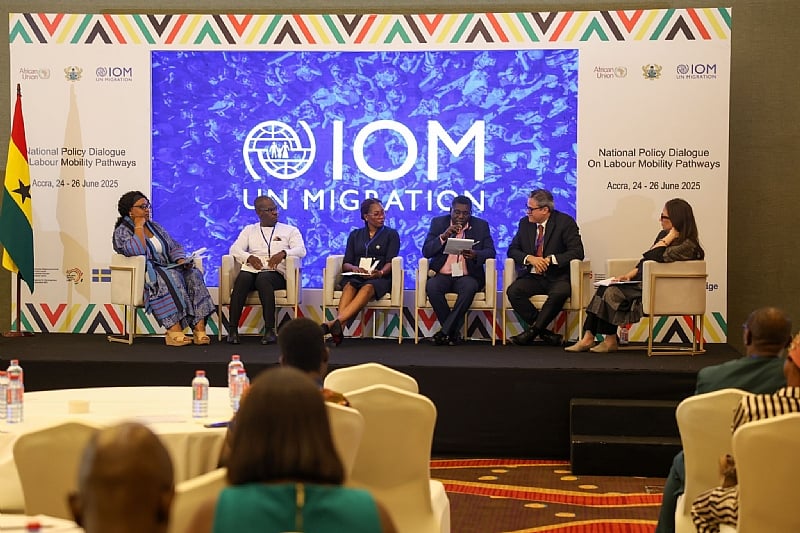Accra, June 27, 2025 – The Government of the Republic of Ghana has convened the National Policy Dialogue on Labour Mobility Routes, which aims to transform the potential of labour migrants into the outcome of sustainable development, in collaboration with the International Organization for Migration (IOM) and the Committee on African Union (AUC).
In 2019, over 970,000 Ghanaians lived abroad, sending their money home, sharing their skills and investing in the country. At the same time, Ghana hosts more than 466,000 international migrants, primarily from countries of the economic community of West African countries (ECOWAS), demonstrating strong relations with the region's labor market. With an active diaspora, a growing youth population and strong regional partnerships, Ghana is well suited to use labour mobility to boost its economy and support development across West Africa.
“The National Policy Dialogue on Labor Mobility Channels marks a historic milestone in our collective pursuit for security, order and regular migration routes,” said Dr. Abdul Rashid Hassan Perpuo, Minister of Labor and Employment. “This initiative will undoubtedly help empower people, strengthen the economy and promote aspirations for sustainable development.”
The three-day discussion brought together the diplomatic missions of senior policymakers, regional and international organizations, World Bank, representatives of the diplomatic relations, private sector, civil society actors, immigration and the major destinations of immigration in Ghana, creating a coordinated vision of safe, regular, dignified labor mobility, not just Ghana but also Central Africa.
“This dialogue is coming at a critical time for Ghana and the region,” said Fatau Dialo Ndiai, Iom Ghana Mission Chief. “In a time when irregular migrants continue to put immigrants at risk of exploitation and abuse, expanding regular migration routes is a humanitarian need and an opportunity for development,” she added.
As a champion country in implementing Global Compact migration, Ghana continues to innovate and lead the protection of not only migrants living abroad, but also Ghanaians abroad. In recent years, Ghana has aligned its global and regional frameworks with legal policies, including key instruments such as AU Agenda 2063, AU Immigration Policy in Africa, National Labour and Migration Policy, Human Trafficking Law, Immigration Law, National Immigration Policy, and Diaspora Engagement Policy.
Ghana also has been deepening international cooperation through the development of Bilateral Labour Migration Agreement (BLMAS) and Skills Mobility Partnerships, with comprehensive support through the AU-IOM-ILO Joint Labour Migration Programme (JLMP), and strengthening its commitment to safe, normal, and mutually beneficial labour mobility.
The high-level policy dialogue identified key priorities, including strong coordination between institutions and stakeholders, improved data sharing, skill partnerships, complementary pathways, and innovative approaches to labour mobility, including schemes that combine education with work and protection.
As the labor market evolves and the dynamics of transition move to West and Central Africa, the IOM continues to be committed to its role as a trusted convener, supporting governments, communities and partners in co-created solutions that ensure migration is safe, regular and beneficial for all.
The National Policy Dialogue on Ghana's Labour Mobility Routes was carried out with support from the JLMP and was funded by the Swiss Development Cooperation Agency and the Swedish International Development Cooperation Agency.


